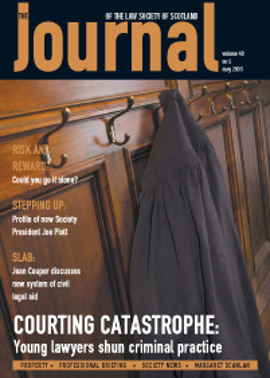Licensing
In this, the first of a series of articles, the answer to the introductory question, “What next?” could not be simpler – Nicholson, Nicholson and Nicholson. For those who do not know, the Nicholson Committee is about to publish its report containing recommendations for reform of Scottish liquor licensing law. The quarter century since the last reform has seen a radical change in social habits as well as a dramatic change in our attitudes to, and treatment of, alcohol.
The terms of reference of the Nicholson committee are much wider than a mere review of the law. The committee is enjoined to have “particular reference to the implications for health and public order.” Recommended changes are to be “in the public interest.” In short, we are expecting a report on a par with the much lauded report of the Clayson committee, whose report led to the last reform of the law, the 1976 Act.
Clayson looked at Scottish drinking habits and did not like what he saw. Much of his report considered ways of demystifying alcohol, and of encouraging a more civilised approach to alcohol use. Many town centres were no-go areas for the fainthearted at around 10.15 pm, when the pubs emptied. It was felt that a short extension of hours, and availability of alcohol throughout the day, would alleviate the unpleasant consequences of excess drinking in a short time just before closing time.
Ironically, Clayson was unhappy with his creation. He recommended an 11.00 pm closing time. While he recommended the concept of a regular extension of permitted hours, he anticipated that it would be used only in exceptional cases. In fact, virtually all licensed premises have an extension of some kind. If reporting today, he would have been concerned at the increase in binge drinking and soaring alcohol consumption among the young.
Nicholson also faces significant problems. Law reform involving social engineering is fraught with difficulty, especially when administered and applied in fifty different licensing areas. Ask representatives of the licensed trade what they dislike about the current regime and most will complain of inconsistency. For example, pubs in neighbouring villages having different closing hours. If licensing boards are to add attempts at social engineering to their repertoire, where will this lead us? Do board members have the knowledge, training and expertise for such a role? Where is the line to be drawn between acceptable trade competition and unacceptable practice? What are the current issues which require attention?
There is currently much concern about binge drinking among young people, and rightly so; however, the cynic might mutter, “plus ca change.” Is the banning of “happy hours” the answer? If so, how do you do that? Does it mean that any discounting will be banned? How do you distinguish between, say, 12 bottles of champagne for the price of 10, and double vodkas for the price of singles? Some of the discounts offered by the major supermarkets at the festive season are much more extreme. Identifying and drawing a line in this area would be hard enough on a nationwide basis: on a district basis it will be well nigh impossible.
Not only are the lines drawn on shifting sands, but the areas of concern change from time to time. Over the years, I recall concerns expressed about lager louts, alcopops, and raves, to mention a few. Some issues have been effectively tackled by central government – the Criminal Justice (Scotland) Act 1980 was instrumental in a huge improvement in behaviour at football grounds. Other changes have been shown to be no more than knee jerk reactions, eg, the so-called “rave conditions” made possible under sections 18A and B of the 1976 Act, sections which, so far as I am aware, have never been invoked.
It is right and proper that Government should deal with issues of concern as they arise. It is probably right that local licensing boards can to an extent focus on local concerns. However, in today’s global village, it is surely wrong to divide a country as small as Scotland into 50 parish councils when dealing with matters such as health and public order. Imagine the result if, in 1980, alcohol had been legal in Easter Road and Tynecastle, but banned in Ibrox and Parkhead. If we end up with different regulations on discounting in different cities, the courts are very soon going to be choc a bloc with litigation instigated by the major players.
Clayson did not achieve the result he wanted. Both the Nicholson committee and the legislators who act on its recommendations will have to think long and hard about their strategy and how it might go off the rails if not thought through properly. I am hopeful for a good report; however, there must be proper consultation especially at the draft legislation stage. Successive governments have proved deficient at this latter exercise, and the quality of the legislation has reflected that. The deficiencies of the 1976 Act are well documented. As a nation we deserve better this time.
Tom Johnston, Young & Partners
In this issue
- Scotland's courts face lost generation catastrophe
- Compromise is better option to confrontation
- Date set for reform package
- Risk and reward await those who go on their own
- A matter of opinion
- Organise workload to make your valuable time count
- Continuity planning takes drama out of a crisis
- Pursuers panel advises on professional negligence
- Client relations
- Platt aiming to push forward
- President's column
- Abandonment at common law still competent
- Holiday heaven or hell?
- Data Protection Act 1998 - what you need to know
- Getting to grips with debt
- Europe
- How the leopard changed its spots
- Licensing
- Scottish Solicitors' Discipline Tribunal
- Scottish Solicitors' Discipline Tribunal (1)
- Scottish Solicitors' Discipline Tribunal (2)
- Website reviews
- Book reviews
- Contaminated land must be discussed with clients
- Property reports service now online






